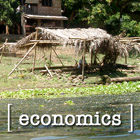
|
POVERTY DISGUISED BY DISTANCE COMPARATIVE ANALYSIS OF POVERTY IN US & CONGO YIELD FEW CLUES AS TO MEASURE OF HAPPINESS 31 December 2005 The Economist magazine has published an article, in the 20 December edition, dealing with the subject of poverty relative to environment. It examines the economic situations of two men, one an impoverished elderly man in remote Appalachia, in the US, the other an accomplished surgeon in Kinshasa, Democratic Republic of Congo (DR Congo). The two men earn roughly the same income per month, a fact that in itself puts the problem of comparative economics in harsh light. One man at the top of his society's professional class, one of the most respected physicians in his country, another living in the remote reaches of an historically underdeveloped region of the world's most prosperous economy, on equal footing, numerically. The vital comparison the Economist makes, which has to underscore the entire story of any similarity or contrast inthe two men's situations is the penetration of corruption tied to mineral resources into the daily lives of their respective regions. Whereas eastern Kentucky's coal wealth, according to the report, has bred a culture of political mischief and neglect, evading important regulatory law, essentially motivating officials to turn a blind eye to suffering and hardship among residents in remote areas, DR Congo's metals wealth has bred a state of extreme violence and sustained conflict. The doctor's $250 per month salary is five times what it was just one year ago, a jump due in part to DR Congo's receiving massive debt relief at the end of its brutal civil war in 2003. The doctor also faces shortages in vital amenities, with scarce and sporadic electricity and no air conditioning. According to the Economist, 75% of poor households in the US have air conditioning. But, in 1988, when a massive heat wave struck the US midwest, an estimated 5,000 to 10,000 died of heat-stress related effects. When in 2002 a heat wave hit California, and energy companies engaged in a supply/pricing dispute with the state's government underserved power to vulnerable areas, dozens or even hundreds of elderly and infirm people died. In France, in 2003, an extreme heat wave killed at least 11,000 people (some estimates rose to 15,000), and as many as 35,000 across Europe. So, part of the underlying problem, no matter the degree to which poverty may be relative to one's economy overall, is that it distances its victims from levers of influence that might rescue them in emergency situations. Compare the American Appalachian and the Congolese doctor to the tens of millions that live in poverty in China. They have, in theory, access to resources from the state to keep them from real desperation, but rampant corruption and the brutalization of anyone who seeks legal means of arbitrating an injustice, keep their stories out of any transmissible spotlight and so society at large and the world outside simply don't perceive their plight. The problem of corruption in politics is so severe in DR Congo that elections promised for last June never materialized. A constitutional referendum has now been held, but Congolese citizens told observers and journalists they were provided with no access to information about what the Constitution contained. Dr. Kabamba reportedly refused a post in the nation's cabinet, apparently due to his skepticism of Congolese politics or his desire not to be involved with the kind of people who are drawn to it. The article concludes with the somewhat dubious but understandable claim that since the poor in the US enjoy a lot of luxuries that most people in the world do not, their discontent is partly "cultural". Maybe, but their poverty, relative or otherwise, is real, because each society organizes its resources around its own standards and so those with less will always struggle to afford the basic necessities, according to the strategies by which they are made available in the prevailing system. More essentially, the Economist notees the level of social standing the two men enjoy: though enjoying conveniences the Congolese doctor does not, Mr. Banks of eastern Kentucky is brushed aside by his society's measures of human worth, whereas Dr. Kabamba, who faces the hardships of a large family, scant means, routine mugging by armed public officials, and general instability, enjoys the prestige his position and his skills afford him. Ultimately, happiness is not discernible through the lens of simple or even complex comparative economics. It is not only a qualitative measure, but a highly subjective one. Any two people with exactly the same socio-economic circumstances could for personal reasons have very different levels of or experiences with happiness. But perhaps the Economist article shows that it is the possibility of and the right to pursue greater fulfilment, happiness and even luxury that determines the likelihood that one can determine one's own degree of satisfaction with respect to economic standing and wellbeing. [For more: The Economist] |
|||||||
|
||||||||
